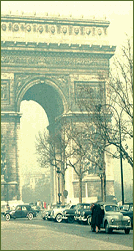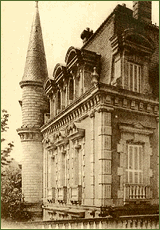|
With a desperate French effort to reinforce their lines and by a
German failure to press home the attack, the city was saved.
And in the most famous incident known as the "miracle on the Marne", thousands
of Parisian taxis were commandeered to carry soldiers to the front lines, which then
enabled the French to push back the Germans to Oise that is some 75 miles from the city.
The lines stayed almost static for the next four years, with Paris experiencing the
occasional bombardment from enemy aircraft and the giant long distance artillery guns.
The city life survived for a while before being subdued by the bloodshed on the front and
the impact of rationing, plus on top of that there was a devastating flu epidemic in 1916.
The war was finally ended by the Armistice of 11 November 1918, which was signed at
Compiegne to the northeast of Paris.
The city emerged into an energetic but restless interwar period, with a troubled political
period, especially when the great depression hit Paris.
After the violence in 1934 the Socialists and the Communists united to form a Popular
Front, and took over power in 1936, only to fall a year later.
Unfortunately, it was France's political divisions that were a major factor in the country
not being prepared for the outbreak of the Second World War on 3 September 1939.
Some of the Catholic Right were openly hostile to parliamentary democracy, Socialism and
Communism, and welcomed the possibility of a fascist regime, that would be imposed by
foreign forces.
It took the German army only a month to reach Paris after Adolph Hitler invaded France on
10 May 1940, going through neutral Belgium around the Maginot Line, where the French
defences were massed.
Paris fell with virtually no resistance on 14 June 1940 and much of the city's population
fled, with almost half of the inhabitants leaving between May and June 1940.
The government agreed an armistice with the invaders and moved south to Vichy, whilst
Paris, along with around another two thirds of France was under German occupation.
Adolph Hitler arrived in Paris on 23 June 1940 to inspect his latest conquest.
The next four years saw an increasingly brutal occupation regime imposed on the city of Paris. On the surface, things continued
much as before and Paris became a very popular place for German forces and the favourite
destination for those with time off. Although some Parisians welcomed the occupation
forces and accepted their presence and their business, most just kept their heads down,
enduring the rationing. However, there were those resisted, but faced the constant
threat of torture and death at the hands of the Gestapo.
Within 48 hours of the fall of Paris, the persecution of Jews began, when they were
required to register with police. On 14 May 1941 the Vichy police began deporting
Parisian Jews, rounding them up at the Winter Velodrome. A concentration camp was
established in the Parisian suburb of Drancy to serve as a waystation en route to
Auschwitz and around 70,000 people passed through this camp, which was run by the French
authorities on behalf of the Nazis until July 1943.
In June 1944, Allied forces invaded Normandy along with 140
resistant fighters. Two months later they broke through German lines and advanced rapidly
across France.
Led by the Resistance and the city's police, an uprising broke out in Paris on 19 August
1944. Adolph Hitler ordered the city's commandant, Von Choltitz, to destroy the
capital, as running battles were being fought in the streets of Paris, however, Von
Choltitz stalled.
When General Leclerc's 2nd Armoured Division and the United States 4th Infantry Division
arrived on the outskirts of the city, Von Choltitz surrendered and ordered his forces to
retreat, which left the city of Paris open and largely intact. They entered the city
to a jubilant reception, and Charles De Gaulle established a temporary government that
lasted until 1946.
After the restoration of civilian rule and the proclamation of the Fourth Republic in
1946, Paris made a rapid recovery, mainly due to the fact that the city sustained
relatively minimal damage during the war.
|
|



